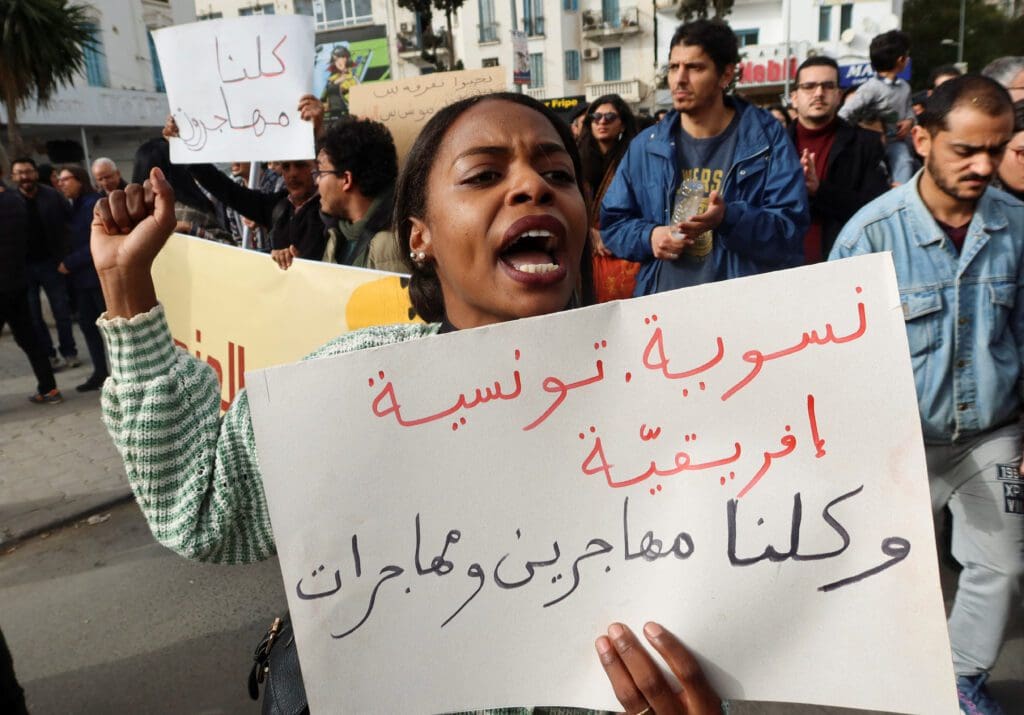In late February, Tunisian President Kais Saied made incendiary claims against Sub-Saharan Africans in the country. Asserting that “hordes” of paperless migrants represented a “criminal plot” to change Tunisia’s racial make-up and blur its Arab-Muslim identity, he accused them of causing a wave of “violence, crimes, and unacceptable acts” and called for “urgent measures to halt their entry into the country.
Saied’s speech sparked both a civil society backlash and a wave of violence against black people in Tunisia, including its own citizens. Both Tunisian and foreign observers accused Saied of using hate speech, encouraging racism, and mimicking the “great displacement” trope used by the French far-right to demonize North African migrants. Saied’s government has denied such allegations, claiming the entire row represents a foreign “campaign against Tunisia.”
But following his speech, authorities have cracked down on Sub-Saharan migrants, detaining many who did not have residence permits. Saied’s comments also triggered racist attacks by some Tunisian citizens, who assaulted migrants, irrespective of their legal status. Some landlords, fearing heavy fines or prison, have thrown hundreds of migrants including children and pregnant women onto the streets.
In some cases, violence has also targeted black Tunisians, who make up 10% of the population. This points to a deeper problem of race relations in the country, which persists despite Tunisia in 2018 becoming the only state in the region with a law criminalizing racial discrimination.
Some 80% of respondents to a 2021-22 Arab Barometer survey believed that racial discrimination was a serious problem, the highest figure in the 10 Arab countries covered. Sixty-three percent said anti-Black discrimination was a problem.
Who are the Sub-Saharan migrants living in Tunisia?
According to the latest national population survey of 2021, just over 21,400 Sub-Saharan Africans live in Tunisia, making up around a third of total foreigners in the country. Their numbers have nearly tripled since 2014, but they still make up less than 0.2% of the total population, nowhere close to “changing the demographic composition of the country.” They also represent only a minority of the black population in Tunisia.
When asked about their reasons for coming to Tunisia, half of these migrants were looking for better economic and employment opportunities, while more than one-third were seeking better education. Two-thirds had no intention of living in Tunisia indefinitely and expressed plans to either go back to their home country or relocate elsewhere. Indeed, many consider the North African country a gateway to Europe, staying for a couple of years to save money before joining thousands of young Tunisians on perilous sea journeys northward toward what they hope will be better lives.
Looking more closely at the demographics based on the 2021 survey, Sub-Saharan migrants are less than 27 years old on average; two thirds are males, and one third are from Côte d’Ivoire. Nearly 40% of the migrants have an above secondary education and around 27% have a higher education degree. Among those aged 15 and above, only 42% are employed. Many cite the difficulty in finding a job as a major reason for wanting to leave Tunisia.
Indeed, unemployment in Tunisia continues to be among the highest in the Middle East and North Africa and the world. This situation and their lack of official papers pushes many undocumented Sub-Saharans to accept low-skilled jobs with minimum pay and no job protection—no contracts, wage protection, or health insurance. They usually work in jobs shunned by young Tunisians, such as domestic work or construction.
The plight of migrants sits in a broader context of Tunisia’s various structural challenges, which were deepened by the COVID-19 pandemic. Public debt is high and on the rise. The inflation rate exceeds 2011 levels and continues to increase, diminishing people’s purchasing power. And foreign direct investment (FDI) inflows are declining.
On the political front, people are increasingly dissatisfied and detached, as illustrated by record low turnout in recent elections. Saied’s government is also cracking down on his rivals, arresting opposition figures in what Amnesty International has called a “politically motivated witch hunt.” All this is a far cry from the high hopes many Tunisians had for a democratic future after the 2011 revolution.
Saied’s recent moves have fueled some angry demonstrations. On February 26, hundreds gathered in the capital to denounce Saied’s anti-immigration speech with slogans such as “Down with fascism, Tunisia is an African country.” A week later, thousands rallied against the crackdown in a demonstration organized by Tunisia’s powerful UGTT trade union federation.
Many believe Saied’s anti-immigration and conspiracy discourse is nothing but a tactic to distract from the country’s real problems and scapegoat African migrants for the country’s deepening economic and political woes. Yet the result is that Sub-Saharan migrants are living in fear, often in the streets. Many are trying to leave the country after being harassed and attacked. Hundreds have registered with their embassies requesting to be repatriated, including more than 1,000 of the 7,000 Ivorians in Tunisia.
Instead of overhauling immigration laws to allow refugees, students, and those with much-needed skills to integrate in Tunisian society, Saied has chosen to use them as a political card. But this move has already had high costs. Already, tensions with African states are growing. The African Union issued a statement warning against “racialized hate speech” and postponed a conference it had planned for mid-March in Tunisia, on tackling illicit financial flows. The World Bank has also paused talks on future funding, potentially jeopardizing the International Monetary Fund bailout Tunisia desperately needs. Whatever Saied’s motivations for putting migrants in the cross-hairs, the episode has been bad for all involved, and is just adding to Tunisia’s myriad problems.
The opinions expressed in this article are those of the author and do not necessarily reflect the views of the Middle East Council on Global Affairs.


